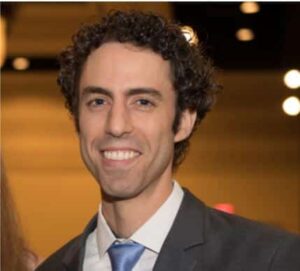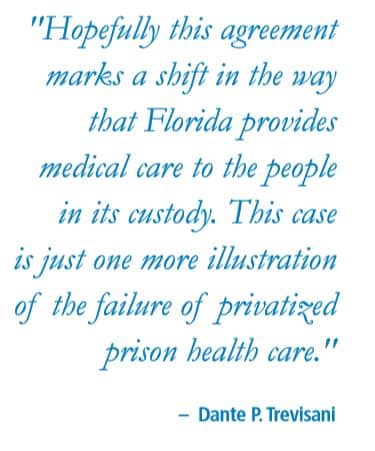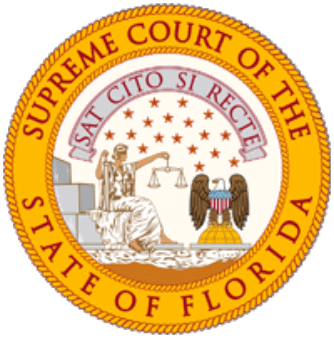
When the pain began, Archie Green knew he needed to see a medical professional. Though the 40-year-old man was a prisoner of the Florida Department of Corrections (FDOC), he still expected to receive some kind of treatment for increasingly distressing symptoms.
Feeling a knot bulging from his groin, Green asked for an appointment with the prison medical office. He was told no. Having worked in construction most of his life, Green suspected he’d sustained an injury when he tried to stop a heavy barrel from falling off a trailer while doing his prison job. As the pain became excruciating, he asked six more times for an appointment over the course of a week in 2012.
“I was in a lot of pain. I couldn’t exercise no more, they’d taken my gate pass from me, said Green. “They put me on restricted activity. I don’t think they really cared.”
Eventually, he was granted a visit with a physician. He was diagnosed with a hernia, and the doctor stated that he met the criteria for surgery. Yet, he was denied the operation. For three and a half more years, Green would suffer.
The physical pain was not the only consequence. With his gate pass revoked, Green, a minimum-security inmate, could not complete steps to become eligible for a work release center since he could not leave the prison grounds.
“They wouldn’t let me work,” said Green. “Completely delayed my process altogether.”
In 2014, Green was transferred to Lake Correctional Institution where he met a fellow inmate who mentioned Florida Justice Institute (FJI) and its work for another inmate with a hernia.
Miami-based FJI conducts civil rights litigation and advocacy in the areas of prisoners’ rights, housing discrimination, disability discrimination, and other areas. The Foundation awarded FJI a $175,000 Bank of America Community Economic Development Initiative grant this year.
“So I wrote them,” said Green. “It was a short time, in four or five weeks, they got ahold of me, came and seen me. They were really awesome people.”

After hearing Green’s story, lawyers from FJI asked him and two other prisoners to represent a class of prisoners with untreated hernias in a suit against the FDOC and its medical contractor Corizon, LLC. Their complaint alleged there was a policy and practice of unlawfully denying medically necessary hernia surgeries in an effort to save costs, resulting in possibly thousands of prisoners being left in severe pain, unable to engage in normal activities, and at risk for serious complications such as bowel obstruction, infection, and even death.
“If they can not do treatment, they’re saving money,” said Green. “If you can get a few guys to speak out and get the treatment, they’re still saving money cause there’s thousands of them not getting the treatment. It’s business. They said no inmate would be denied medical treatment due to the cost of medical care, medication. It’s just not happening.”
 Just three days after FJI and co-counsel Kozyak Tropin Throckmorton, a firm specializing in complex civil litigation, filed the complaint, Green was called to the prison medical office.
Just three days after FJI and co-counsel Kozyak Tropin Throckmorton, a firm specializing in complex civil litigation, filed the complaint, Green was called to the prison medical office.
“They said Corizon had changed their mind, and they want to do the surgery,” said Green. “About three weeks after that, I was taken in for surgery. I never received treatment til the lawsuit was filed.”
Green made a full recovery, and he and about 2,000 other current and formerly incarcerated persons with hernias were awarded a combined $2.1 million when the case was settled. The Court also required the FDOC to officially change its health care policy to ensure that hernia patients are promptly referred to surgeons for consultations, and that the recommendations from those surgeons are carried out.
“We’re pleased that the FDOC has agreed to change its policy on hernia treatment, and that the patients who were affected by it will receive some financial compensation,” said Randall C. Berg, Jr., FJI’s executive director. “This settlement is one step toward the overall improvement of medical care for all incarcerated people in Florida.”
Berg and FJI attorneys Dante P. Trevisani and Erica Selig co-counseled the case with Kozyak Tropin and Throckmorton attorneys Kenneth Hartman, Tucker Ronzetti, and Douglas Wolfe. The firm donated their share of their attorneys’ fees to FJI.
This spring, Green, now 46, received his settlement check.
Without the help of lawyers, says Green, “I’d still be in pain right now.”




